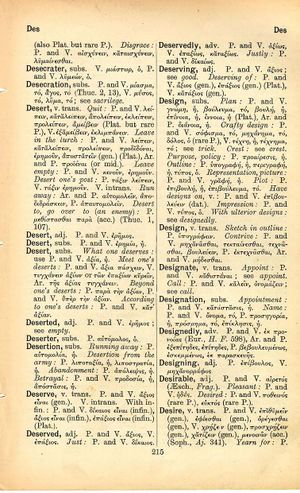desire
ἐὰν οὖν τὰ μαλακὰ σκληρῶς καὶ τὰ σκληρὰ μαλακῶς λέγηται, πιθανὸν γίγνεται → but if, as a result, gentle things are said harshly and harsh things gently, the result is unpersuasive
English > Greek (Woodhouse)
v. trans.
P. and V. ἐπιθυμεῖν (gen.), ἐφίεσθαι (gen.), ὀρέγεσθαι (gen.), V. χρῄζειν (gen.), προσχρῄζειν (gen.), χατίζειν (gen.), μενοινᾶν (acc.) (Soph., Aj. 341).
Yearn for: P. and V. ποθεῖν (acc.), Ar. and V. ἱμείρειν (gcn.), V. ἱμείρεσθαι (gen.).
Be enamoured of: P. and V. ἐρᾶν (gen.), Ar. and V. ἔρασθαι (gen.).
Seek: P. and V. ζητεῖν.
Desire ardently: P. γλίχεσθαι (gen.).
V. intrans. Also with infin.: P. and V. ἐπιθυμεῖν, ἐφίεσθαι, βούλεσθαι, ὀρέγεσθαι, Ar. and P. ἐθέλειν, V. ἱμείρειν, ἱμείρεσθαι, ποθεῖν, ἐρᾶν, ἔρασθαι, προσχρῄζειν, Ar. and V. μενοινᾶν (Eur., Cycl. 448), θέλειν, χρῄζειν (rare P.).
Desire ardently (with infin.): P. γλίχεσθαι.
Seek (with infin.): P. and V. ζητεῖν.
subs.
P. and V. ἐπιθυμία, ἡ.
Request: P. and V. χρεία, ἡ.
Love: P. and V. ἔρως, ὁ, πόθος, ὁ (Plat. but rare P.), ἵμερος, ὁ (Plat. but rare P.).
Desire of: P. and V. ἐπιθυμία, ἡ (gen.), ἔρως, ὁ (rare P.) (gen.). πόθος, ὁ (rare P.) (gen.).

